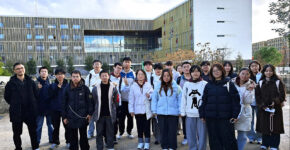National, regional, and international project funding programs
International financing
Hubert Curien Partnerships
The objective of PHCs is to develop scientific and technological exchanges of excellence between research laboratories in two scientific communities by promoting new collaborations. They are established by the Ministry of Foreign Affairs and International Development in partnership with the Ministry of National Education, Higher Education, and Research.
Research projects must be established jointly by two research teams, one French and one foreign. The PHC funds international mobility for researchers involved in the partnership.
The deadlines for submission vary depending on the destination:
- May: Lebanon, Egypt, Turkey, Switzerland, Latvia, Brazil, Italy, Algeria, Slovenia, Hungary.
- June: Germany, Belgium, Palestine, Brazil, Hong Kong, Poland, Czech Republic, Slovakia, Iran, and the Netherlands.
- July: New Zealand, Serbia, Thailand.
- August: Taiwan.
- September: Iceland
The amount of financial aid awarded depends on the destination and length of stay. You can find average costs and deadlines by destination on the Campus France website.
The engineering and project support department of the Innovation and Partnerships Division is available to assist you in putting together your proposal.
COFECUB
The COFECUB (French Committee for the Evaluation of University and Scientific Cooperation with Brazil) was created in 1979 to evaluate and oversee exchanges in research and training with Brazil.
This program represents a total of 134 projects and approximately 530 missions per year. They cover a variety of disciplines, and the projects supported by COFECUB have resulted in numerous scientific publications.
Two agreements are currently in place:
- The CAPES-COFECUB agreement aims to ensure the long-term future of high-level exchanges. It provides equal co-financing for short-term research missions and full funding for Brazilian scholarship holders.
- The USP-COFECUB agreement aims to create an academic exchange system through which Professors and French Professors can develop high-level joint research projects.
ECOS South
The Scientific Cooperation Evaluation and Orientation Program (ECOS) is designed to support outstanding scientific collaboration projects with countries in Latin America and the Caribbean. It funds exchanges between researchers in the form of short-term missions, advanced training courses, and doctoral fellowships. This program is open to all fields of knowledge. Its approach is based on two fundamental principles: partnership and transparency.
The partnership begins at the level of institutions, teams of academics, and researchers who work together to develop a scientific project in which their intellectual involvement must be equivalent.
Postgraduate cooperation programs
Postgraduate Cooperation Programs (PCPs) aim to promote training and professional development for all those involved in higher education and research. PCPs enable the results of joint research to be exploited and international training and research initiatives to be implemented. The co-supervised or joint supervision thesis system is the main instrument of this program, which thus involves doctoral training for students from France and the countries concerned.
The PREFALC program
The France-Latin America-Caribbean Regional Program (PREFALC) is a French program for academic and scientific cooperation with countries in Latin America, Central America, and the Caribbean.
Program objectives:
- develop academic and scientific exchanges between French universities and their partners in Latin American and Caribbean countries;
- promote the creation of joint Master's degrees and/or introduce French training modules into existing Master's degrees at partner universities;
- promote the establishment of dual Master's and Doctorate degrees under joint supervision;
- participate in the emergence of a "European Union-Latin America-Caribbean higher education area."
Eligibility requirements and operating procedures: projects must involve Master's/Maestria-level students at partner institutions and present the organization of training modules. Inter-university partnerships lasting two years, renewable, may be formed between at least one higher education institution in France and one institution in a Latin American or Caribbean country.
Each project is the subject of an annual report as well as scientific and educational monitoring.
PUF Program
The PUF program promotes Franco-American exchanges in higher education and research. This program is sponsored by the French American Cultural Exchange Foundation.
PUF funding is open to all American and French higher education and research institutions. All types of projects are eligible for funding (collaborative research, student orProfessors mobility, establishment of joint transatlantic degrees, etc.). All disciplines are eligible.
The France-Canada Research Fund Research FFCR)
The FFCR supports Franco-Canadian research projects and promotes scientific exchanges in all fields of knowledge, from the hard sciences to the humanities and social sciences. It operates on an annual call for proposals basis, and applications are evaluated by a panel of Canadian experts and the French ministry responsible for research.
For more information, visit the website of the French Embassy in Canada.
Samuel de Champlain Program
The Samuel de Champlain Program is aimed at academics and research professionals working in research centers or institutes in France and Quebec. In particular, it supports the international mobility of researchers and students participating in Franco-Quebec research projects.
European funding
Horizon 2020
Horizon 2020 brings together for the first time in a single program European research and innovation projects such as the FP, Euratom, innovation actions under the Competitiveness and Innovation Framework Program, and the European Institute of Innovation and Technology.
This new program refocuses funding on three priorities that correspond to the expectations of French stakeholders:
- Scientific excellence
- Industrial supremacy
- Societal challenges
International cooperation is an integral part of the Horizon 2020 program.
Erasmus
Erasmus+ 2021-2027 is the European Commission's program for education and training.
The program includes two main types of actions:
- Actions related to the mobility of students and staff in higher education institutions, as well as strategies for creating joint master's degrees.
- Cooperation to promote educational innovation, academic excellence, and closer ties with the business world
KEY ACTION 1: Mobility
Joint Master's Degrees
The program supports the establishment of integrated master's degree programs of excellence offered by consortia of higher education institutions from at least three European countries and possibly third countries, including the funding of mobility grants for students and academics.
The programs must involve mobility between the consortium's institutions and lead to the award of a double, multiple, or joint degree recognized by the competent authorities of the countries concerned. All disciplines are eligible.
The European grant for joint master's degrees covers administrative costs and excellence scholarships for the world's best students. The project duration is divided into a first preparatory year and three cohorts of students, which can be renewed under certain conditions. Thus, the duration of a project can vary between 4 and 5 years depending on the duration of the master's degree (1 or 2 years).
KEY ACTION 2: Cooperation for innovation and best practices
Strategic partnerships in higher education
Strategic partnerships support cooperation between organizations active in the field of higher education in the joint development of study programs, intensive programs, new pedagogical approaches, and the exchange of best practices.
Activities funded under a strategic partnership are grouped into categories:
- Project implementation and management.
- Intellectual productions.
- Transnational meetings.
- Study/learning/teaching mobility activities.
- Actions likely to ensure increased dissemination and development of the program (multiplier events), known as "dissemination events."
- Exceptional activities.
- Activities involving the participation of people with special needs are encouraged, and specific financial support is provided.
Student mobility can be funded under these partnerships, as well as long-term teaching assignments and short-term training seminars for staff.
Finally, so-called "cross-sector" cooperation activities, involving a wide range of stakeholders within the same partnership (training organizations, local authorities, higher education institutions, businesses, etc.) are encouraged under this program.
For further information on eligibility criteria and rules for participation, please consult the "Penelope +" interface.
Knowledge alliances
Knowledge Alliances promote the establishment of transnational alliances between businesses and higher education institutions in order to strengthen quality and expand the innovation potential of European higher education.
The activities funded under this program are as follows:
- New methods of learning and training
- New training programs
- Training programs and activities with and within companies
- Methods for developing cross-disciplinary skills in cooperation with businesses
- Interdisciplinary awareness of entrepreneurship
- Exchanges of students, researchers, teachers, and employees
For further information on eligibility criteria and rules for participation, please consult the " Penelope + " interface.
Capacity building
Capacity Building projects aim to promote academic cooperation with a view to supporting the modernization of higher education systems in partner countries in Europe, Asia, Russia, and Latin America (150 countries concerned).
This program funds two types of actions:
- Joint projects: these are based on multilateral partnerships between higher education institutions in the EU and partner countries. They enable the development, modernization, and dissemination of new programs, new teaching materials and methods, the promotion of a culture of quality assurance, and the modernization of the management and governance of higher education institutions.
- Structural measures: these contribute to the development and reform of higher education systems and institutions in partner countries, improving their quality and relevance.
For further information on eligibility criteria and rules for participation, please consult the " Penelope + " interface.
Structural Funds
The INTERREG program aims to encourage regional convergence and competitiveness in order to ensure more harmonious development of the European Union. Under certain conditions, the University of Montpellier is eligible for four specific INTERREG IV programs:
- ESP-FR-ANDORRA Cooperation Program (INTERREG IV A)
- SUDOE Program (INTERREG IV B)
- MED Program (INTERREG IV B)
- European interregional cooperation (INTERREG IV C)
Calls for projects Euroregion Pyrenees-Mediterranean
Mobility assistance for jointly supervised theses
The Eurocampus aims to promote knowledge exchange and mobility among students, teachers, and researchers within the Pyrenees-Mediterranean Euroregion, as well as to increase the attractiveness of higher education in the Euroregion. Among other things, Eurocampus provides support to higher education and research stakeholders through assistance with student mobility (Eurocampus mobility check), research (joint supervision of doctoral theses), and the online publication of information and services (Eurocampus internet portal).
This call for applications aims to strengthen academic cooperation through mobility grants for jointly supervised theses. This funding is intended to support Eurocampus doctoral students who are writing a thesis as part of a partnership between Euroregional doctoral schools of different nationalities; the grant covers the additional costs associated with mobility between France and Spain. A bonus is awarded to projects that include collaboration with a company in order to promote professional integration and links between the economic and academic worlds.
The call is open to all fields of knowledge, but particular attention will be given to applications in the areas of e-Health, sustainable water resource management, agri-food, and tourism.
Support for the creation of Euroregional dual degrees
Since 2009, Euroregional cooperation between Catalonia, the Balearic Islands, Languedoc-Roussillon, and Midi-Pyrénées in the fields of higher education, research, and innovation has been taking shape through the implementation of the Eurocampus Pyrénées-Méditerranée, the leading European campus in terms of student numbers. The Eurocampus aims to promote the exchange of knowledge and the mobility of students, teachers, and researchers within the Pyrenees-Mediterranean Euroregion, as well as to increase the attractiveness of higher education in the Euroregion. Among other things, it provides support to higher education and research stakeholders through assistance with student mobility (Eurocampus mobility check), research (joint supervision of doctoral theses), and the online publication of information and services (Internet portal).
This call for applications aims to deepen academic cooperation within Eurocampus through the creation of dual binational degrees. It is open to all fields of knowledge, but particular attention will be given to applications in the areas of e-Health, sustainable water resource management, agri-food, and tourism.
Call for Culture Projects 2014
The members of the Pyrenees-Mediterranean Euroregion wish to promote the cultural diversity of their territories and make the Euroregion a benchmark for artistic creation. They also want to preserve and enhance their shared natural, historical, and cultural heritage with a view to sustainable tourism development.
With a view to promoting territorial cohesion, the Euroregion encourages cultural cooperation that structures the territory and, as such, has created a joint call for projects, led for the fifth consecutive year by its EGTC.
Life +
The Life+ program funds projects aimed at protecting or enhancing the natural environment of the European Union.
Since 1992, 270 projects have been funded by the Life program in France.
More information is available on the European Commission website.
National and regional funding
Eiffel Excellence Scholarship Program for the 2024/2025 academic year
The Ministry for Europe and Foreign Affairs has just launched the new call for applications for the two components of the Eiffel Excellence Scholarships: Master's/Engineering and Doctorate.
This program is a tool offered to French institutions in their search for the best foreign students and doctoral candidates, but it is also an excellent way to bring our institution's inter-university collaboration agreements to life.
Teachers and Professors submit the applications of students and doctoral candidates they wish to support tothe Cooperation Department by December 1, 2023, at 12: 00 p.m.
Students interested in applying
Applications for Eiffel Excellence Scholarships must be supported by a professor at the University of Montpellier.
For Master's/engineering applications, please contactthe program directoryou are interested in, explaining your approach and introducing yourself.
Fordoctoral applications, your thesis co-supervisor at the University of Montpellier must contact the Cooperation Department.
The Cooperation Department of the International Relations Division is available to provide you with information about this program and to guide you in putting together your application.
Additional information is also available on theCampus France website.
National Research Agency (ANR)
As part of the national research strategy defined by the Government, the National Research Agency has the following missions:
- To finance and promote the development of fundamental and applied research, technical innovation and technology transfer, as well as partnerships between the public and private sectors;
- To implement the program established by the Minister responsible for research, who consults with the ministers responsible for research organizations or public higher education institutions;
- Managing major government investment programs in the field of higher education and research, and monitoring their implementation;
- To strengthen scientific cooperation at European and international level by coordinating its programming with European and international initiatives;
- To analyze changes in research funding and measure the impact of the agency's funding on national scientific output.
Contact at UM: [Innovation and Partnerships Department – Project Engineering Service. Tel: +33 (0)4 67 14 39 11
Competitiveness clusters
A competitiveness cluster brings together small and large companies, research laboratories, and educational institutions in a specific region and around a specific theme. A competitiveness cluster aims to support innovation. It promotes the development of particularly innovative collaborative research and development (R&D) projects.
Occitanie region
Research assistance in partnership with companies (ARPE)
The Languedoc-Roussillon Region provides funding to public research laboratories in Languedoc-Roussillon involved in the research and development project through two separate and cumulative methods.
Modality 1: R&D projects
Any public laboratory that has secured funding in partnership with a regional company following a national, European, or international call for research projects may apply for ARPE assistance, which can amount to €75,000.
Option 2: CIFRE THESIS
Your laboratory has set up a CIFRE thesis in partnership with a company in Languedoc-Roussillon: + €5,000
Call for projects: Researchers of the Future
This program supports talented young scientists and their research teams in the regions, helping them to establish themselves more quickly in their field and accelerating the emergence of new, innovative avenues of research that promote the economic exploitation of research results and job creation. This call for projects has been open every two years since 2009.
Agency for the Environment and Energy Management (ADEME)
ADEME participates in the implementation of public policies on energy and environmental protection. It is involved in the following areas:
- Waste management;
- Soil conservation;
- Energy efficiency;
- Renewable energy;
- Air quality;
- Noise control.
Associations, foundations
Non-profit associations, foundations, and non-governmental organizations support research through calls for projects. Some examples:
Fund it – Platform for funding research in the humanities and social sciences
The Fondation Maison des Sciences de l’Homme and the RFIEA (French Network of Institutes for Advanced Studies) announce the launch of the "Fund it" platform, dedicated to funding research in the social sciences and humanities, at the end of May 2016.
This platform centralizes on a single site all calls for applications relating to research stays in France and abroad, as well as all calls for projects to obtain funding for individual or collaborative research.
The Engineering and Project Support Service of the Innovation and Partnerships Department is available to assist you in putting together your applications by [email | rf.re1771422317illep1771422317tnomu1771422317@pi-a1771422317pid1771422317].



